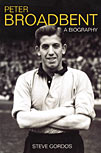 A Biography
A Biography
by Steve Gordos
Breedon Books, £12.99
Reviewed by Jim Heath
From WSC 257 July 2008
Having started to support Wolves almost 40 years ago, I just missed out on the halcyon period between 1949 and 1960 when they won two FA Cups and three League titles. Recent retrospectives on captain Billy Wright and manager Stan Cullis have opened up a new dimension on the era and Steve Gordos’s biography of inside-forward Peter Broadbent, now stricken with Alzheimer’s, adds richly to that seam.
Gordos charts Broadbent’s career from the Kent coalfields of Elvington via Dover and Brentford to Molineux for what was then a record transfer fee for a teenager – £10,000. It is clearly a labour of love for the author, who first saw Wolves on the opening day of 1954-55 as they began the defence of their title with a 4-2 defeat of Sheffield Wednesday: “I have no precise memory of the goals. The one thing I do remember is seeing Peter Broadbent. He had a certain way of beating players, with almost a shrug of the shoulders and a way of passing the ball, caressing it almost. There was just something about him.”
Throughout, Gordos continually challenges this grand assessment, as if he had got it all wrong – but, supported by fine testimony from those who reported on Wolves at the time, he succeeds in presenting a pretty unshakeable case for Broadbent being the key figure in that side. Interviews with former team-mates are interspersed with extracts from the work of the legendary Phil Morgan, a one-club reporter for the local newspaper who travelled on the team coach to away games and was the primary source of Wolves news in an era when the print media dominated. These are used sparingly to ensure that the book doesn’t become a slavish list of statistics or run-of-the-mill match facts.
However, it is the touching details of a humble lifestyle that are at the heart of the story, including Broadbent’s courtship of his future wife, digs shared with Ron Flowers, Saturday-night dances and cinema trips. The author also delves into the era’s football politics, investigating why Broadbent played only seven times for England. The national team, while coached by Walter Winterbottom, was often chosen by an FA committee, and as a consequence there were always uncomfortable compromises. One of these was an unofficial limit on the number of players from one club. Even if Broadbent was the best inside-forward in the land (for which Gordos makes a very convincing case), Wolves were already well represented, with Billy Wright, Ron Flowers, Bill Slater and Denis Wilshaw among those from the club competing for places.
It is argued that this is one of the reasons why the more orthodox Johnny Haynes from the less successful Fulham was often selected instead of Broadbent. With internationals played on Saturdays at the same time as League fixtures, clubs had as much reason to try to dictate England selection policy as they do today.
My first ;ife memory is seeing Peter Broadbent play for Dover Athletic on a crisp Boxing Day, I was Three years old and was more impressed by the Canterbury strip(Green and White hoops)than the game but do remeber my elders discussing Peter Broadbent .
My great uncle was the scout for Arsenal covering the Kent League but for whatever reason encouraged my dad to recommend Peter to Wolves. As a junior school boy I carried the letter of reply from Stan Cullis until it fell apart.
My father held a fairly important position with Goodyear Tyres in Wolverhampton and I was able to meet many players from the great years because if this, Billy Wright(who always stopped to speak to my father and make a fuss of me in the street on match days)Ron Flowers (who always jumped off the bus outside the ground and Peter who sauntered down from the bus stop at about 2.45.
I always like the quote from George Best,who watched the Wolves during the floodlit European Years that he considered Peter Broadbent to be th ebest player he ever saw